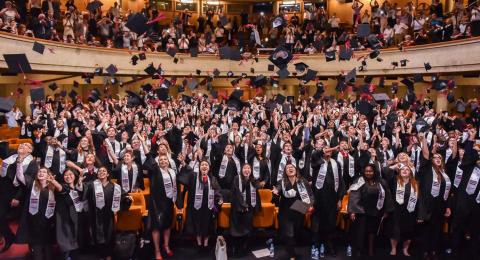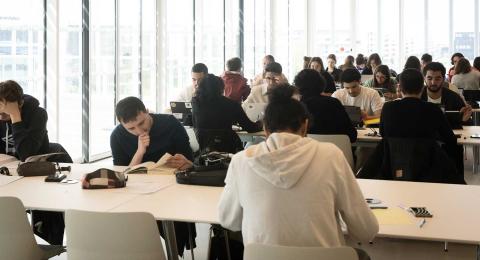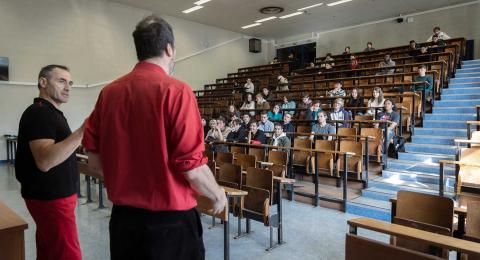The M2 BIBS-IA program of the Master in Bioinformatics trains research and development experts at the intersection of biology, computer science, and mathematics. Students acquire in-demand skills in artificial intelligence, data management and analysis, and modeling across various areas of bioinformatics—genomics, structural biology, evolutionary biology, and digital health. These skills are applied in the life sciences, medicine, environmental sciences, and agronomy.
The M2 BIBS-IA program is built as a continuation of the M1 BIBS-IA. The “Profile” section specifies the expected prerequisites.
Within the BIBS-IA track, artificial intelligence and data science play a central role, approached both from a theoretical perspective (in mathematics and computer science) and from an applied perspective, closely linked to the specificities of biological and biomedical data.
Multidisciplinary projects and hackathons are organized by experts from academia and industry. Students have access to a wide range of elective teaching modules, allowing them to specialize (applications of artificial intelligence in structural biology, genomics, clinical contexts, agronomy, etc.).
A mandatory 4- to 6-month internship ensures strong future career prospects for students, whether in research or in industry.
Information
Skills
The skills acquired upon completion of the M2 BIBS-IA are aligned with the national framework of the Master in Bioinformatics (RNCP 38964).
- Understand current challenges related to complexity and diversity in biology and the life sciences in general, and contribute actively to research and innovation in the academic, pharmaceutical, biotechnological, agri-industrial, and healthcare sectors;
- Address the challenges arising from the evolution and development of high-throughput data production technologies, coming from multiple and heterogeneous sources;
- Master computational approaches and artificial intelligence to analyze, model, and interpret large-scale biomedical data;
- Lead bioinformatics projects independently, in multidisciplinary environments, by developing innovative solutions using appropriate computational tools and programming languages;
- Experiment with, develop, and test new methods to explore hypotheses in the life sciences, at the interface between fundamental and applied research.
Objectives
The M2 BIBS-IA program is dedicated to the advanced research and development needs of companies and research organizations in bioinformatics and biostatistics.
This multidisciplinary training program meets these needs by preparing specialists at the interface of biology, computer science, and mathematics.
Upon completion of the M2 BIBS-IA, students master several programming languages, a wide range of artificial intelligence, algorithmic, statistical, and data science methods, enabling them to store, model, and analyze large-scale genomic and biomedical data. They also deepen their knowledge in key areas of bioinformatics (systems biology, structural biology, functional genomics) and apply the methods learned to diverse projects in life sciences and medicine, as well as in environmental sciences and agronomy.
The curriculum of the M2 BIBS-IA is organized into six major knowledge and skills blocks:
Block 1 – Management of large-scale data and optimization.
This block includes three teaching units focused on optimizing the processing of various types of data (relational databases and graph data). A project based on massive real-world datasets allows students to put their acquired knowledge into practice.
Block 2 – High-throughput genomics.
This block comprises two teaching units: one focused on comparative genomics and another on population genomics, with strong emphasis on the application of statistical methods in these domains.
Block 3 – Data analysis and AI for biology.
This block includes three teaching units, covering topics ranging from fundamental AI concepts such as machine learning models, to applications of AI in integrative biology and image analysis.
Block 4 – Scientific integrity and reproducibility.
This block comprises two pre-professional teaching units: a reprohackathon project and a unit supporting professional integration. Students acquire best practices in open science, scientific integrity, ethics, and energy efficiency (ecological impact of digital practices, particularly artificial intelligence).
Block 5 – Advanced applications of Artificial Intelligence.
Students select four teaching units within this block, which includes six dedicated to the M2 BIBS-IA track and focused on diverse applications of AI. Examples include a data camp (a machine learning hackathon on real-world datasets, jointly organized with École Polytechnique and Télécom Paris) and data mining in agronomy (jointly with AgroParisTech). In addition, students may choose elective units from other Master’s programs (Computer Science, Biology-Health, etc.).
Career Opportunities
Career prospects
Après Master + Doctorat : chercheur ou enseignant-chercheur
Ingénieur Bioinformaticien (Recherche et Développement)
Expert en gestion de données
data scientist
Expert science des données
Further Study Opportunities
Doctorat en Bioinformatique
Chercheur/chercheuse en R&D ou expert·e en modélisation et analyse de données dans des entreprises ou laboratoires de pointe.
Data Scientist, Data Analyst, Ingénieur·e en Machine Learning dans des secteurs innovants (tech, finance, santé, énergie, etc.) ;
Fees and scholarships
The amounts may vary depending on the programme and your personal circumstances.
Capacity
Available Places
Target Audience and Entry Requirements
Most courses in the M2 BIBS-IA program are taught in French, therefore proficiency in the French language is required.
The M2 BIBS-IA is designed as a continuation of the M1 BIBS-IA and brings together three student profiles:
- Students who have successfully completed the M1 BIBS-IA, all of whom are admitted into the M2 BIBS-IA;
- Students from AgroParisTech enrolled in the IODAA track (From Information to Decision through Analysis and Learning), all of whom complete a double degree year with the M2 BIBS-IA;
- (Subject to availability) Students who have completed an M1 equivalent to the M1 BIBS-IA, i.e., who have acquired equivalent knowledge and skills in biology, mathematics, and computer science (see the M1 BIBS-IA program for further details).
Students who already hold a Master’s degree in Bioinformatics are not eligible. Students holding a Master’s degree in a field other than bioinformatics (biology, computer science, or mathematics) may apply for entry into the M1. However, their applications will be considered less of a priority than those from students applying directly after a Bachelor’s degree.
Application Period(s)
From 04/05/2026 to 13/07/2026
Supporting documents
Compulsory supporting documents
Motivation letter.
All transcripts of the years / semesters validated since the high school diploma at the date of application.
Curriculum Vitae.
Additional supporting documents
Certificate of French (compulsory for non-French speakers).
Certificate of English level (compulsory for non-English speakers) or GMAT / GRE test results.
Detailed description and hourly volume of courses taken since the beginning of the university program.
VAP file (obligatory for all persons requesting a valuation of the assets to enter the diploma).
Document indicating the list of local M2 choices available here : https://urlz.fr/i3Lo.
Supporting documents :
- Residence permit stating the country of residence of the first country
- Or receipt of request stating the country of first asylum
- Or document from the UNHCR granting refugee status
- Or receipt of refugee status request delivered in France
- Or residence permit stating the refugee status delivered in France
- Or document stating subsidiary protection in France or abroad
- Or document stating temporary protection in France or abroad.










